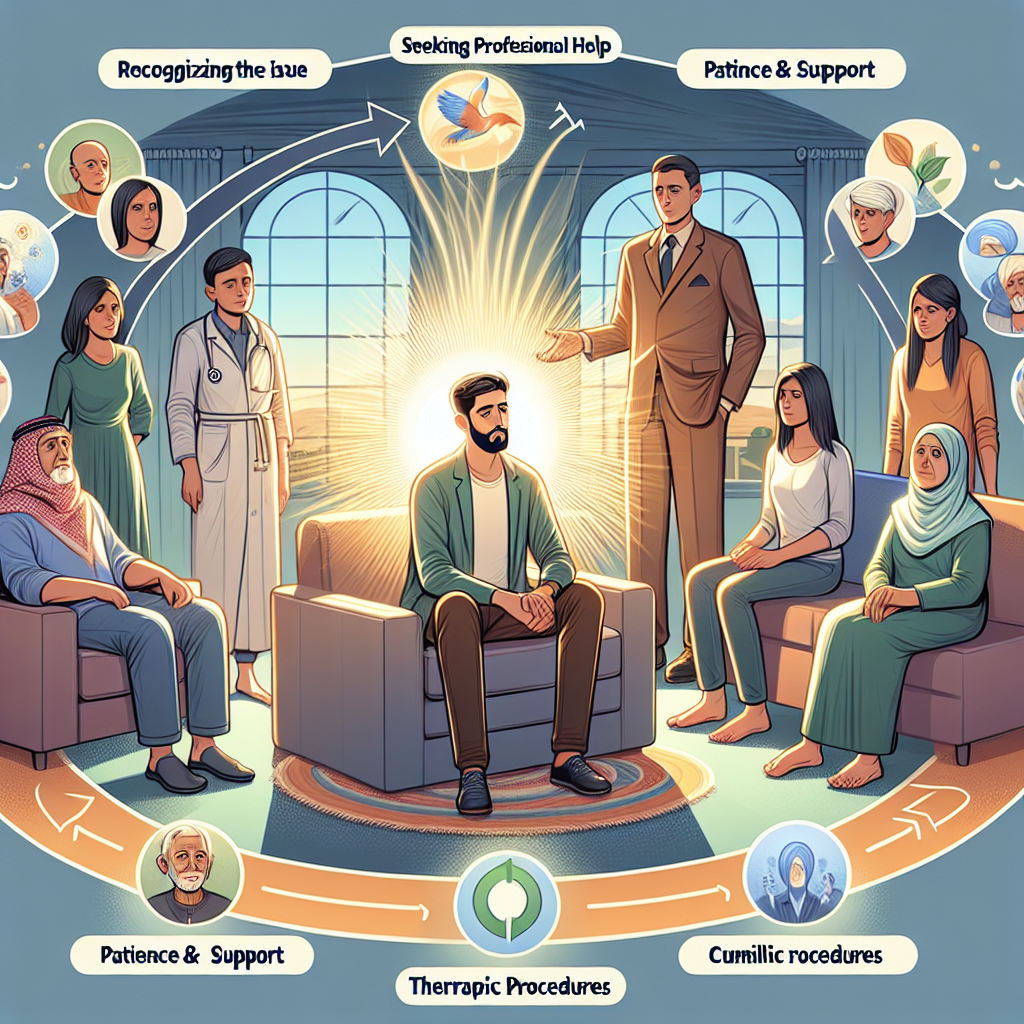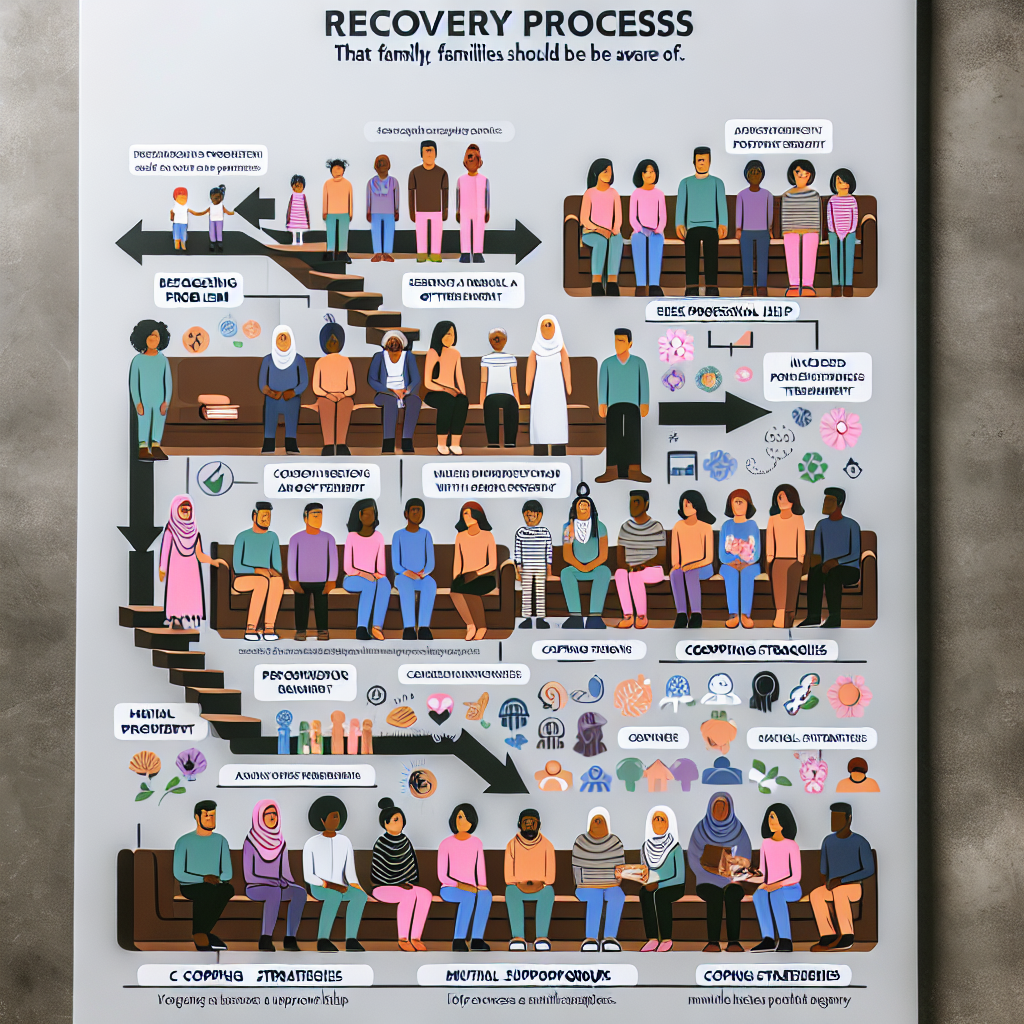-
Table of Contents

“Empowering Families: Navigating the Path to Recovery Together”
Introduction
Understanding the Recovery Process: What Families Need to Know
The journey of recovery from addiction or mental health issues is a complex and multifaceted process that not only affects the individual but also has a profound impact on their family. Families play a crucial role in supporting their loved ones through recovery, yet they often find themselves navigating uncharted territory filled with emotional, psychological, and practical challenges. Understanding the recovery process is essential for families to provide effective support, foster a healing environment, and maintain their own well-being. This introduction aims to shed light on the key aspects of the recovery process, offering families the knowledge and tools they need to navigate this challenging journey with empathy, resilience, and hope.
Navigating Emotional Challenges: A Family’s Guide to Supporting Recovery
Understanding the recovery process is a journey that involves not just the individual in need of healing but also their family. Navigating the emotional challenges that come with supporting a loved one through recovery can be daunting. However, with the right knowledge and approach, families can play a pivotal role in fostering a supportive environment that encourages healing and growth.
First and foremost, it is essential for families to recognize that recovery is not a linear process. There will be ups and downs, moments of progress, and times of setback. This understanding can help temper expectations and reduce frustration when things do not go as planned. Patience becomes a crucial virtue, as it allows family members to provide consistent support without becoming disheartened by temporary regressions.
Communication is another cornerstone of effective support. Open, honest, and non-judgmental dialogue can help build trust and understanding. It is important for family members to listen actively, offering empathy rather than solutions. This approach can make the individual in recovery feel heard and valued, which is vital for their emotional well-being. Additionally, families should educate themselves about the nature of the recovery process, whether it involves addiction, mental health issues, or physical rehabilitation. Knowledge can dispel myths and reduce fear, making it easier to offer informed and compassionate support.
Moreover, setting healthy boundaries is crucial for both the individual in recovery and their family members. Boundaries help maintain a balance between offering support and enabling harmful behaviors. They also protect the emotional health of family members, ensuring that they do not become overwhelmed or burnt out. It is important to remember that self-care is not selfish; it is a necessary component of being able to provide sustained support.
In addition to setting boundaries, families should encourage their loved ones to take responsibility for their own recovery. This empowerment can foster a sense of agency and self-efficacy, which are important for long-term success. Encouraging participation in therapy, support groups, or other recovery programs can provide additional layers of support and accountability.
While the focus is often on the individual in recovery, it is equally important for family members to seek their own support. Joining family support groups or engaging in therapy can provide a safe space to express emotions, gain insights, and learn coping strategies. This communal support can be incredibly validating and can help family members feel less isolated in their experiences.
Celebrating small victories along the way can also be incredibly motivating. Acknowledging progress, no matter how minor it may seem, can boost morale and reinforce positive behaviors. These celebrations can serve as reminders that recovery is a series of small steps rather than giant leaps.
Lastly, maintaining hope is essential. Recovery is a challenging journey, but it is also a journey of resilience, growth, and transformation. Families who maintain a hopeful outlook can inspire their loved ones to keep pushing forward, even when the road seems long and arduous. By fostering an environment of love, understanding, and unwavering support, families can become a powerful force in the recovery process.
In conclusion, navigating the emotional challenges of supporting a loved one through recovery requires patience, communication, education, and self-care. By setting healthy boundaries, encouraging responsibility, seeking support, celebrating progress, and maintaining hope, families can provide the foundation needed for successful recovery. This journey, while challenging, is also an opportunity for profound connection and mutual growth.
Building a Supportive Environment: Key Steps for Families in the Recovery Process
Understanding the Recovery Process: What Families Need to Know
Building a supportive environment is crucial for families navigating the recovery process of a loved one. The journey to recovery is often fraught with challenges, but with the right support system, it can also be a time of profound growth and healing. To begin with, it is essential for families to educate themselves about the nature of the addiction or mental health issue their loved one is facing. Knowledge is power, and understanding the complexities of the condition can foster empathy and patience, which are vital components of a supportive environment.
Transitioning from understanding to action, families should focus on open and honest communication. Creating a safe space where the individual in recovery feels heard and understood can significantly impact their progress. This involves active listening, where family members pay close attention to what is being said without judgment or interruption. By validating their loved one’s feelings and experiences, families can help reduce the sense of isolation that often accompanies recovery.
Moreover, setting realistic expectations is another key step in building a supportive environment. Recovery is not a linear process; it involves setbacks and relapses. Families should be prepared for these eventualities and approach them with compassion rather than frustration. Encouraging small, incremental progress rather than expecting immediate, drastic changes can help maintain a positive and supportive atmosphere. Celebrating milestones, no matter how small, can also provide much-needed motivation for the individual in recovery.
In addition to emotional support, practical assistance can make a significant difference. This might include helping with daily tasks, providing transportation to therapy sessions, or assisting with medication management. By alleviating some of the practical burdens, families can allow their loved ones to focus more on their recovery journey. However, it is important to strike a balance and avoid enabling behaviors that might hinder the recovery process. Encouraging independence and self-reliance, while still offering support, can empower the individual to take ownership of their recovery.
Furthermore, self-care for family members is an often-overlooked aspect of building a supportive environment. The recovery process can be emotionally and physically draining for everyone involved. Families should ensure they are also taking care of their own well-being by seeking support from friends, support groups, or professional counselors. By maintaining their own health and well-being, family members can be more effective in providing the necessary support for their loved one.
Another critical element is fostering a positive and hopeful outlook. Recovery is a long-term commitment, and maintaining a hopeful perspective can be incredibly motivating. Families should focus on the progress made rather than dwelling on past mistakes or setbacks. Encouraging a forward-looking attitude can help the individual in recovery to stay committed to their goals and continue striving for improvement.
Lastly, involving the individual in recovery in family activities and decisions can help them feel valued and included. This sense of belonging can be a powerful motivator and can reinforce their commitment to the recovery process. By integrating them into the family dynamic, families can help rebuild trust and strengthen relationships that may have been strained by the addiction or mental health issue.
In conclusion, building a supportive environment for a loved one in recovery involves a combination of education, communication, realistic expectations, practical assistance, self-care, positivity, and inclusion. By taking these key steps, families can create a nurturing and empowering atmosphere that significantly enhances the recovery process. Through patience, understanding, and unwavering support, families can help their loved ones navigate the path to recovery and build a brighter future together.
Q&A
1. **Question:** What are the key stages of the recovery process for individuals overcoming addiction?
**Answer:** The key stages of the recovery process typically include pre-contemplation, contemplation, preparation, action, maintenance, and sometimes relapse. Each stage represents a different level of readiness and engagement in the recovery journey.
2. **Question:** How can families support a loved one during their recovery process?
**Answer:** Families can support a loved one by educating themselves about addiction and recovery, offering emotional support, encouraging healthy habits, setting boundaries, and seeking professional help when necessary. It’s also important for families to take care of their own mental and emotional well-being.
Conclusion
In conclusion, understanding the recovery process is crucial for families supporting a loved one through addiction or mental health challenges. It involves recognizing that recovery is a long-term journey with potential setbacks, requiring patience, empathy, and consistent support. Families should educate themselves about the nature of the condition, treatment options, and the importance of a supportive environment. Effective communication, setting healthy boundaries, and seeking professional guidance are essential components. By fostering a supportive and informed atmosphere, families can significantly contribute to their loved one’s successful recovery and overall well-being.



